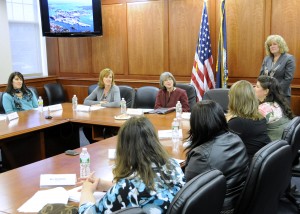On May 8, 2012, I traveled to New England and had an opportunity to meet with and talk and listen to with three distinct groups: students, faculty and staff at Dover High School (Dover, NH); senior administrators, including President Mark Huddleston, at the University of New Hampshire (Durham, NH); and military spouses as well as the Base Commander Bryant Fuller and his spouse at Portsmouth Naval Shipyard (Kittery, ME).

From left to right Julie Weinstein, Candace Fuller, Dr. Gross, and standing is Pat Riordan, the Base Support Officer. Photo courtesy of U.S. Navy -Portsmouth Naval Shipyard.
I anticipated these audiences would raise quite different questions and concerns in our gatherings, given differing nature of the institutions from which they hailed. The participants ranged from high school students of whom approximately 50% head to college and for whom extensive travel outside their state was uncommon to military spouses who moved every 18 months within the US and abroad, often with school-aged children. The audiences included young people navigating how to graduate from high school (let alone college) to experienced college administrators seeking to navigate sizable state-wide budget cuts while helping students complete their undergraduate education in a timely fashion.
Despite these obvious differences, certain key recurring questions and concerns came through all the conversations, most particularly these two: (1) How can college be made more affordable for all students? and (2) What can the federal government do to improve and influence positively the educational experiences of and outcomes for vulnerable students in the pre-K – 16 pipeline?.
Not easy questions and ones for which there are no easy answers. That said,
I was deeply appreciative of the thoughtful and heartfelt observations raised by the almost 750 people with whom I met. I was struck by the many concrete examples the audiences presented, many of which provided a new lens through which to see the issues of concern. Those who spoke were open, forthright and clear. They were concerned. They were not shy. But, most of all, they were not cynical. Instead, they wanted and needed information; they wanted and needed answers; they wanted and needed a government that could help.
As I listened and answered, I was also struck by the disconnect between what we are doing here in Washington to address these very questions and the amount of information actually gets filtered back and heard outside the proverbial Beltway. There are initiatives that the federal government has completed (like new federal loan repayment options) and others that are proposed (like Race to the Top and First in the World for higher education) on the very questions raised by these audiences. We do have new tools that can assist students in selecting quality, affordable education, and we do have some efforts in place to solve problems military- children experience as they transition from one school to another.
But, the decibel level is so high, the information so vast and the complexity so great that it is hard for the government to communicate effectively to, and reach and be heard by, the needed audiences including students and their parents, college personnel and military families.
I was and remain heartened by the voices of the many audience members at these three events – individuals who wanted to improve their lives and those of children and young adults. I welcomed the chance to share what we are doing here in DC. And, what I hope is that this conversation and many more like them will open the door to not only more dialogue but to thoughtful and meaningful ways to improve our educational system – for the children of today and tomorrow.
Karen Gross is a senior policy advisor at the U.S. Department of Education






